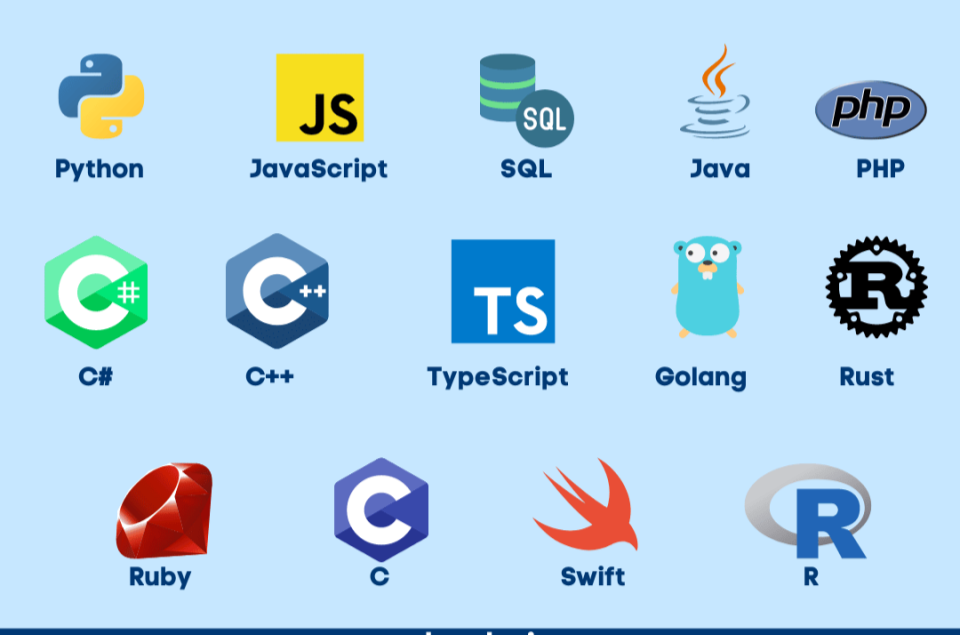General-Purpose Programming Languages
- C: A foundational language that has influenced many other languages.
- C++: An extension of C, with object-oriented features.
- Java: Widely used in enterprise environments, Android apps, and more.
- Python: Known for its readability and versatility in web development, data science, and automation.
- Ruby: Popular for web development, especially with the Ruby on Rails framework.
- PHP: Commonly used for server-side scripting in web development.
- Perl: Known for its text processing capabilities and system administration.
- Go (Golang): Developed by Google, it's known for simplicity and performance.
- Swift: Apple's language for iOS and macOS development.
- Kotlin: A modern language fully interoperable with Java, favored for Android development.
- Rust: Focused on safety and performance, often used in systems programming.
- Dart: Used primarily with the Flutter framework for cross-platform mobile apps.
- R: Specialized in statistical computing and data analysis.
- Julia: Designed for high-performance numerical and scientific computing.
- Haskell: A purely functional programming language, known for its type system.
- Lua: Lightweight, used in game development and embedded systems.
- Objective-C: Historically used for macOS and iOS development before Swift.
- Scala: Combines object-oriented and functional programming, used in big data processing.
- TypeScript: A superset of JavaScript with static typing, used in large-scale web applications.
- Shell Scripting (Bash, PowerShell, etc.): Used for automating tasks in the operating system.
Systems Programming Languages
- Assembly Language: Low-level programming for directly interacting with hardware.
- C: Often used for operating systems, embedded systems, and high-performance applications.
- Ada: Used in systems where safety and reliability are critical, like aerospace.
- VHDL: Used for hardware description and designing electronic systems.
Web Development Languages
- HTML/CSS: The standard markup and styling languages for creating web pages.
- JavaScript: The scripting language of the web, used for interactive features.
- TypeScript: Adds static types to JavaScript, enhancing code quality.
- PHP: Server-side scripting for web applications.
- Ruby: Often used with the Ruby on Rails framework for web development.
- Elixir: Functional language for scalable web applications, often used with Phoenix.
- ASP.NET (C#): A framework for building web apps on the .NET platform.
Mobile Development Languages
- Java: Used for Android app development.
- Swift: Used for iOS and macOS app development.
- Kotlin: Officially supported for Android development.
- Dart: Used with the Flutter framework for cross-platform mobile apps.
- Objective-C: Historically used for iOS before Swift became the preferred language.
- C#: Used with Xamarin for cross-platform mobile development.
Game Development Languages
- C++: The primary language for game engines like Unreal Engine.
- C#: Widely used with Unity for game development.
- Java: Used in Android game development.
- Python: Used in scripting for game engines like Blender.
- Lua: Often used in game engines like Corona and in modding communities.
Functional Programming Languages
- Haskell: Known for its purity and strong type system.
- Erlang: Used for building highly concurrent and fault-tolerant systems.
- Elixir: Built on the Erlang VM, used for scalable web applications.
- OCaml: A functional programming language with object-oriented features.
- F#: A functional-first language on the .NET platform.
Scripting Languages
- Python: Often used for scripting tasks due to its ease of use.
- Perl: Known for its text processing and scripting capabilities.
- Bash: Commonly used for shell scripting in Unix-like operating systems.
- PowerShell: Used for task automation and configuration management on Windows.
Historical and Niche Languages
- FORTRAN: One of the oldest languages, used for scientific computing.
- COBOL: Used in business, finance, and administrative systems.
- Lisp: One of the oldest high-level languages, influential in AI research.
- Prolog: A logic programming language used in AI and computational linguistics.
- Smalltalk: An early object-oriented language that influenced many others.
- Pascal: Used in education and early software development.
- Basic: An early language for beginners and personal computing.
- APL: Known for its concise syntax, used in mathematical computing.
Database Query Languages
- SQL: The standard language for querying and managing relational databases.
- PL/SQL: Oracle's procedural extension to SQL.
- T-SQL: Microsoft's extension to SQL for use with SQL Server.
- NoSQL Query Languages: Such as MongoDB’s query language, which varies by database system.
Emerging and Specialized Languages
- Nim: A statically typed language that compiles to C, known for efficiency.
- Crystal: Syntax similar to Ruby but with performance close to C.
- Zig: A language focused on low-level programming with modern features.
- Wasm (WebAssembly): A binary instruction format for a stack-based virtual machine, used in web browsers for high-performance applications.
- V: A simple and fast language, gaining attention for its ease of use.
- Forth: A stack-based language used in embedded systems and hardware programming.
- Racket: A descendant of Scheme (itself a variant of Lisp), known for its flexibility in language creation and research.
Educational Languages
- Scratch: A visual programming language used to teach children the basics of coding.
- Logo: Known for its turtle graphics, used in education.
- Alice: A 3D programming environment for teaching object-oriented programming concepts.
Esoteric Languages
- Brainfuck: Known for its minimalistic design and as a challenge for programmers.
- Malbolge: Designed to be as difficult as possible to program in.
- Whitespace: Uses only whitespace characters as commands.
Domain-Specific Languages
- RPG (Report Program Generator): Used in IBM’s midrange computer systems.
- VHDL/Verilog: Used in hardware description for electronic circuit design.
- Matlab/Octave: Used in engineering and scientific calculations.
- SAS: Used in statistics, business analytics, and data management.
- ABAP: SAP’s proprietary language used in their ERP systems.
This list provides an overview of many, but not all, programming languages. Each language has its strengths, weaknesses, and specific use cases, making the choice of language highly dependent on the task at hand, the developer’s familiarity, and the industry requirements.
 English
English
 العربية
العربية


Comments
bitcoin dark web dark web site dark web sites links
dark web marketplaces darknet market
Add New Comment